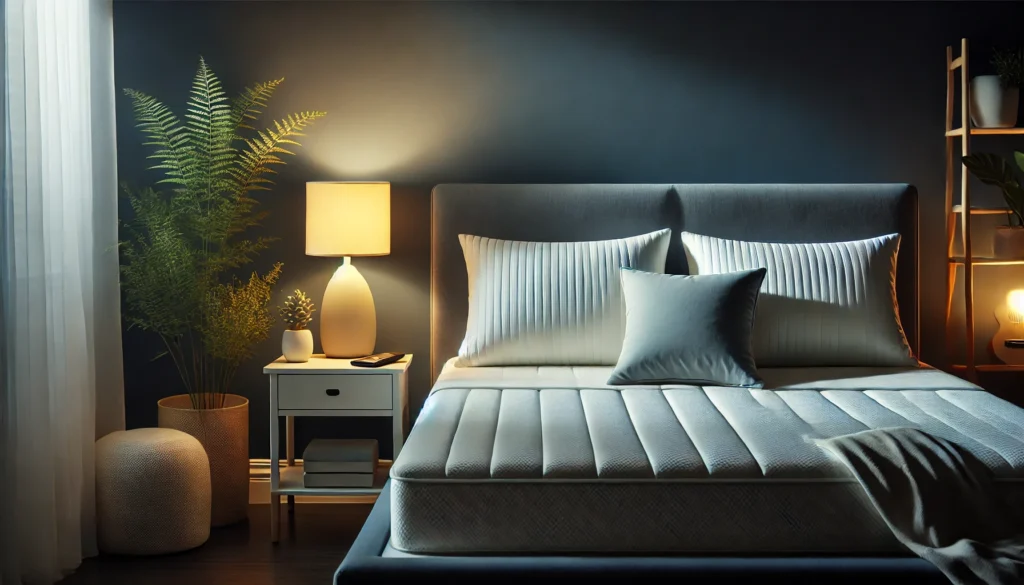Sleep tension is a common issue that many people grapple with. It’s a condition where muscles remain tense during sleep, leading to discomfort and restlessness.
Understanding sleep tension is crucial. It’s not just about the quality of sleep, but also about overall health and well-being.
This article aims to shed light on sleep tension. We’ll delve into its causes, effects, and potential solutions. The goal is to provide comprehensive, accessible information on this topic.
Health and wellness coaches can use this information to help their clients. It’s also useful for science journalists seeking to translate complex medical information into digestible content.
Biohackers, too, can benefit from this article. It offers insights into optimizing sleep quality and reducing muscle tension.
We’ll explore the science behind sleep tension, its common causes, and its impact on health. We’ll also discuss psychological and environmental contributors to sleep tension.
Finally, we’ll provide strategies for reducing sleep tension. These include natural remedies, therapeutic interventions, and advanced techniques.
By understanding sleep tension, we can take steps towards better sleep and improved health. Let’s dive in.
You May Also Like: Sleep Hygiene: Key Practices for Health
The Science of Sleep Tension
Sleep tension is often characterized by involuntary muscle contractions during sleep. Many individuals experience this issue, leading to questions like, “Why do I tense up when I sleep?” It’s relatively common, affecting a significant portion of the population.
Muscle tension, or hypertonicity, occurs when muscles remain contracted even when they’re supposed to be relaxed. This involuntary action often disrupts the sleep cycle. Understanding why muscles tense during sleep involves examining physiological processes.
During sleep, the body undergoes several transitions between different sleep stages. Each stage serves distinct purposes for recovery and rest. The alternation between stages can sometimes lead to improper regulation of muscle tone.
The nervous system plays a crucial role in managing muscle tone. It acts as a command center, sending signals that determine when muscles should contract or relax. In some individuals, this signaling is disrupted, leading to tension.
Several factors can exacerbate this malfunction in the nervous system, including stress and anxiety. Such psychological states can cause heightened muscle responses, resulting in an uncomfortable night’s rest. The body’s stress responses are complex and intertwined with physical processes.
An understanding of these processes is essential for addressing sleep tension effectively. The goal is to normalize the body’s transition into restful states, thereby reducing tension. By correcting the underlying physiological and neurological imbalances, sleep quality can improve.
To summarize:
- Sleep tension results from involuntary muscle contractions during sleep.
- It is common among many people.
- The muscle tension disrupts sleep cycles.
- The nervous system’s signaling impacts muscle tone.
- Stress and anxiety can amplify muscle responses.
- Addressing these factors can improve sleep quality.
Common Causes of Sleep Tension
Understanding why muscles tense during sleep involves identifying underlying causes. Stress and anxiety stand out as primary culprits. When these feelings linger, they trigger physical responses, including muscle tension, even at night.
Anxiety often leads to a heightened state of alertness. The mind races, and the body’s response systems remain active. This state of vigilance can persist during rest, causing anxious muscle tension while sleeping.
Lifestyle factors also contribute to sleep tension. A balanced diet supports muscle function and sleep quality. Poor nutrition can exacerbate tension, leading to restless nights. Likewise, regular exercise helps relieve stress and promote relaxation, reducing the chances of muscle tension during sleep.
The sleep environment plays a pivotal role in relaxation. A comfortable setting with proper bedding supports muscle relaxation. Unsuitable mattresses or pillows often cause the body to tense up while trying to sleep.
Medical conditions can lead to tense muscles when sleeping. Disorders such as Restless Legs Syndrome or periodic limb movement disorder cause involuntary muscle contractions. Such conditions often go unnoticed but significantly impact sleep quality.
Moreover, sleep disorders can increase the likelihood of muscle tension. Conditions like insomnia can heighten stress, making it difficult to achieve restful sleep. Sleep apnea may exacerbate tension by disrupting normal sleep patterns, leaving muscles in a state of unease.
Key causes include:
- Stress and anxiety keep the body alert.
- Diet impacts muscle relaxation and tension.
- Exercise reduces stress and tension.
- A comfortable environment supports restful sleep.
- Medical conditions can lead to involuntary muscle contractions.
- Sleep disorders disrupt normal sleep patterns.
Addressing these causes requires understanding personal triggers. Awareness can lead to better management of sleep tension, improving overall sleep quality and well-being.

The Impact of Sleep Tension on Health
Sleep tension significantly affects both physical and mental well-being. Tense muscles during sleep can lead to discomfort and pain, reducing overall quality of life. Over time, this can contribute to persistent fatigue and chronic fatigue syndrome.
Chronic muscle tension often results in physical discomfort that extends into waking hours. This can exacerbate existing pain conditions or create new ones. Sleep tension potentially contributes to conditions like headaches, back pain, and temporomandibular joint (TMJ) disorders.
The mental toll of sleep tension should not be underestimated. Persistent sleep disruption can result in cognitive decline. This is manifested in issues such as poor concentration, memory lapses, and difficulty with decision-making. Over time, mental sharpness and attention span may decrease.
Furthermore, the connection between sleep tension and chronic pain is profound. Chronic pain can worsen without adequate, restful sleep. This cycle creates a feedback loop where pain increases tension, further disrupting sleep. Breaking this cycle is vital for improving both sleep quality and overall health. Effective management of sleep tension can reduce the risk of these complications, enhancing physical and mental well-being.
Psychological and Environmental Contributors
Psychological factors can profoundly affect why muscles tense up during sleep. Anxiety and stress are common culprits. They can lead the body into a heightened state of alertness, even during sleep. This makes muscles more prone to tension and spasms.
One’s mindset before sleep plays a crucial role, too. Those who harbor worries or confront unresolved conflicts are more likely to experience anxiety muscle tension while sleeping. The brain’s inability to shut down and relax contributes significantly to body tension.
Certain conditions, like Post-Traumatic Stress Disorder (PTSD), can exacerbate this issue. Individuals with PTSD often experience heightened muscle tension at night. Addressing these underlying psychological factors requires tailored therapy and coping strategies.
The sleep environment also impacts muscle tension significantly. Elements such as room temperature, lighting, and noise levels are major influences. A too-hot or too-cold bedroom can make it difficult for muscles to relax, leading to tension. Proper room conditions, conducive to relaxation, can alleviate much of this tension.
Here’s how your sleep environment can contribute:
- Ambient Temperature: Keep it comfortably cool for muscle relaxation.
- Lighting: Dim lights to signal your body it’s time to relax.
- Noise: Minimize disruptions that can prevent deep sleep cycles.
Moreover, the type of mattress and pillow used can be key factors. Ergonomic support can help maintain natural spinal alignment, thereby preventing undue muscle strain. Ensuring these elements are optimized creates a tranquil atmosphere, reducing the chances of muscles tensing during sleep. Addressing both psychological and environmental factors is crucial for comprehensive management of sleep tension.
Strategies for Reducing Sleep Tension
Reducing sleep tension begins with adopting effective relaxation techniques. Engaging in activities that promote relaxation can help ease tense muscles when sleeping. One effective method is progressive muscle relaxation. This involves systematically tensing and then relaxing each muscle group, promoting a deeper state of relaxation.
Another calming practice is deep breathing exercises. These techniques help to slow down the heart rate and calm the mind. This, in turn, signals the body to release tension.
Creating a wind-down routine is also beneficial. This can include gentle stretching, reading a book, or listening to soothing music. These activities prepare both the body and mind for a restful night.
Consistency is crucial when aiming to reduce sleep tension. Sticking to a regular sleep schedule helps regulate the body’s internal clock. Going to bed and waking up at the same time each day reinforces this pattern. Consistency aids in reducing sleep disruptions that can lead to muscle tension.
Stress management also plays a pivotal role. Incorporating techniques such as journaling or talking through daily stressors can prevent anxiety from impacting sleep. Finding a method that works can dramatically reduce stress and resultant muscle tension.
Mindfulness and meditation offer powerful tools for combating muscle tension. These practices encourage a state of awareness and relaxation. Regular meditation can significantly decrease the effects of tension by promoting mental calmness.
Physical therapy can be beneficial for those with persistent sleep tension. A therapist can offer exercises tailored to strengthen and relax specific muscle groups. Physical therapy can also assist in improving posture, which may reduce tension during sleep.
Here’s a quick list of methods that can aid relaxation:
- Yoga: Gentle stretches and poses help ease muscle tightness.
- Aromatherapy: Scents like lavender can enhance relaxation.
- Hydrotherapy: A warm bath before bed can soothe tense muscles.
Establishing these strategies consistently can significantly impact sleep quality. A holistic approach that incorporates various techniques often yields the best results. Importantly, one should evaluate and adjust their strategies to find what works best for them.
Finally, always remember that persistent sleep tension might require professional attention. Seeking advice from a healthcare provider ensures that underlying issues are addressed, leading to better long-term outcomes. Addressing sleep tension with a well-rounded approach can improve both sleep quality and overall well-being.

Natural Remedies and Therapeutic Interventions
Pharmacological interventions can sometimes be necessary to address sleep tension. Medications such as muscle relaxants are often prescribed to reduce muscle tightness during sleep. These should only be used under a healthcare provider’s supervision. They can provide temporary relief for those experiencing significant tension.
For those seeking more natural alternatives, there are numerous remedies to consider. Herbal supplements, like valerian root and chamomile, are known for their calming properties. These can help reduce anxiety muscle tension while sleeping. Similarly, magnesium supplements are often recommended for their muscle-relaxing effects.
Massage therapy is another effective approach. It targets muscle tightness and promotes relaxation, aiding those with tense muscles while sleeping. Regular massage sessions can enhance overall relaxation, thus improving sleep quality.
Heat and cold therapy also offer potential benefits. Applying a warm compress before bed can soothe tense muscles, while a cold pack can reduce inflammation and discomfort. Alternating between heat and cold can be particularly effective in managing muscle tension during sleep.
Ergonomic sleep aids, such as specially designed pillows and mattresses, can also make a significant difference. These products support proper alignment and comfort, helping to ease body tension up while trying to sleep. Investing in ergonomic bedding can prevent sleep disruptions caused by discomfort or poor posture.
Relaxation techniques, when incorporated into a bedtime routine, can further aid in reducing sleep tension. Practices such as tai chi or qigong promote a state of tranquility and may help reduce the body’s tendency to tense up during sleep. These methods focus on slow, deliberate movements paired with deep breathing.
Here’s a quick overview of some helpful strategies:
- Valerian Root: Helps with relaxation and sleep.
- Magnesium: Supports muscle relaxation.
- Ergonomic Pillows: Enhance sleep comfort.
By exploring these natural remedies and therapies, individuals can find a combination that works for them. Tailoring interventions to personal needs can provide effective relief and improve sleep quality. Always consult with a healthcare provider before starting any new treatment or supplement for sleep tension.
The Role of Diet, Exercise, and Sleep Hygiene
A balanced diet plays a pivotal role in managing sleep tension. Proper nutrient intake supports muscle function and recovery. Foods rich in magnesium, calcium, and potassium are particularly beneficial. These nutrients aid in maintaining muscle elasticity and reducing tension.
Hydration is equally crucial. Dehydration can lead to muscle cramps and increased tension during sleep. Ensure you drink adequate water throughout the day. This simple practice can have profound effects on muscle relaxation during rest.
Exercise is another key factor in improving sleep quality. Regular physical activity helps in reducing overall stress levels. This, in turn, decreases the likelihood of experiencing anxiety muscle tension while sleeping. Activities such as aerobic exercises, yoga, and stretching are particularly effective.
Yoga and stretching can further enhance flexibility and relieve tension. These practices promote relaxation and mental clarity, preparing the body for restful sleep. Engaging in these activities before bed can be especially helpful in easing tense muscles.
Adopting proper sleep hygiene practices is essential for optimizing sleep health. Consistent sleep schedules set the body’s internal clock for better sleep-wake patterns. Creating a calming bedtime routine signals to your body that it’s time to unwind. Avoid electronic devices and bright lights before bedtime to minimize disruptions.
Here’s a summary of key practices:
- Stay Hydrated: Drink plenty of water.
- Eat Balanced: Focus on nutrient-rich foods.
- Regular Exercise: Engage in aerobic activity or yoga.
- Consistent Routine: Prioritize a calming bedtime schedule.
By prioritizing diet, exercise, and sleep hygiene, individuals can significantly reduce sleep tension. These foundational lifestyle habits foster an environment conducive to quality sleep and overall health.
Advanced Techniques and Future Trends
Biofeedback offers a powerful tool for managing sleep tension. This technique helps individuals become aware of physiological processes. By monitoring and altering muscle activity, users learn to reduce tension. Biofeedback devices provide real-time data to facilitate this learning process.
Acupuncture and acupressure are traditional practices gaining modern validation. These techniques target specific points to alleviate tension and stress. Studies suggest that they can improve sleep by regulating bodily functions. Incorporating these practices may offer relief for tense muscles while sleeping.
The field of sleep tension management is continually evolving. Recent research highlights the importance of personalized interventions. Understanding individual sleep patterns and tensions can lead to tailored solutions. Future trends may include personalized digital platforms for real-time monitoring.
Biohacking techniques also promise new avenues for sleep optimization. From smart wearables to sleep-tracking apps, technology is at the forefront. By leveraging data, these tools provide insights into sleep behaviors and tension patterns. Experimenting with these innovations could revolutionize sleep health.
In the realm of future trends, consider these developments:
- Personalization: Individualized sleep solutions.
- Technology Integration: Apps and wearables for sleep tracking.
- Traditional Techniques: Acupuncture and acupressure revitalized.
- Innovative Therapies: Use of biofeedback in muscle tension relief.
With advancements in these areas, the future of sleep tension management looks promising. Embracing these techniques can lead to significant improvements in sleep quality. As research continues, staying informed will be key to achieving optimal health outcomes.

Conclusion: Embracing a Holistic Approach to Sleep Tension
Addressing sleep tension requires a comprehensive strategy. It is essential to incorporate lifestyle changes, relaxation techniques, and when necessary, medical interventions. Combining these approaches can lead to significant improvements in overall well-being.
For persistent issues, seeking professional advice is crucial. A healthcare provider can offer personalized guidance tailored to individual needs. Remember, investing in sleep health is an investment in your long-term vitality and wellness.
Further Reading:
Medical News Today: How to tell if stress is affecting your sleep
Harvard Health Publishing: Try this: Progressive muscle relaxation for sleep
National Library of Medicine: The impact of stress on sleep: Pathogenic sleep reactivity as a vulnerability to insomnia and circadian disorders
Important Note: The information contained in this article is for general informational purposes only, and should not be construed as health or medical advice, nor is it intended to diagnose, prevent, treat, or cure any disease or health condition. Before embarking on any diet, fitness regimen, or program of nutritional supplementation, it is advisable to consult your healthcare professional in order to determine its safety and probable efficacy in terms of your individual state of health.
Regarding Nutritional Supplements Or Other Non-Prescription Health Products: If any nutritional supplements or other non-prescription health products are mentioned in the foregoing article, any claims or statements made about them have not been evaluated by the U.S. Food and Drug Administration, and such nutritional supplements or other health products are not intended to diagnose, treat, cure, or prevent any disease.


